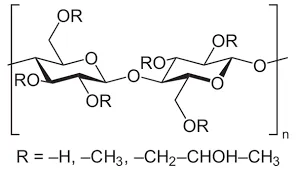
Jul . 12, 2024 07:29 Back to list
Applications of hydroxyethyl cellulose in various industries and products
Hydroxyethyl cellulose (HEC) is a versatile substance that finds a wide range of uses in various industries. This compound is derived from cellulose, a naturally occurring polymer found in plants. By introducing hydroxyethyl groups to the cellulose backbone, a unique material with a plethora of applications is created.
One of the primary uses of HEC is in the construction industry as a thickening agent in cement-based products. When added to cement mixtures, HEC helps improve workability, reduce water content, and enhance the overall performance of the final product. In addition, HEC can also be used as a binder in mortars and plasters, providing improved adhesion and durability to these materials.
In the cosmetics and personal care industry, HEC is commonly used in a variety of products such as creams, lotions, shampoos, and gels. Its thickening and stabilizing properties make it an ideal ingredient for emulsions and suspensions, ensuring the consistency and stability of these formulations. HEC also acts as a film-forming agent, creating a protective barrier on the skin and hair, resulting in improved moisture retention.
Furthermore, HEC is utilized in the pharmaceutical industry as a coating agent for tablets and capsules. Its film-forming properties allow for a smooth and uniform coating, protecting the active ingredients from degradation and improving the overall appearance of the dosage form

hydroxy ethyl cellulose uses. Additionally, HEC can also be used as a viscosity modifier in liquid formulations, providing the desired consistency and flow properties. In the food industry, HEC serves as a thickener, stabilizer, and emulsifier in various products such as sauces, dressings, and desserts. Its ability to enhance texture and improve mouthfeel makes it a popular choice for manufacturers looking to create high-quality food products. HEC is also often used in low-fat and low-calorie formulations as a substitute for traditional thickeners and emulsifiers. In the textile industry, HEC is employed as a sizing agent for yarn and fabric coatings. This helps improve the handling and processing of textiles, as well as enhance the final appearance and performance of the finished product. Additionally, HEC can also be used as a thickener in textile printing pastes, providing better control over the printing process and improving color retention on fabric. Overall, the diverse uses of hydroxyethyl cellulose make it a valuable ingredient in a wide range of industries. Its unique properties and versatility enable manufacturers to create high-quality products with improved performance and functionality. As technology continues to advance, the demand for HEC is expected to grow, as more industries recognize the benefits and advantages it offers.

hydroxy ethyl cellulose uses. Additionally, HEC can also be used as a viscosity modifier in liquid formulations, providing the desired consistency and flow properties. In the food industry, HEC serves as a thickener, stabilizer, and emulsifier in various products such as sauces, dressings, and desserts. Its ability to enhance texture and improve mouthfeel makes it a popular choice for manufacturers looking to create high-quality food products. HEC is also often used in low-fat and low-calorie formulations as a substitute for traditional thickeners and emulsifiers. In the textile industry, HEC is employed as a sizing agent for yarn and fabric coatings. This helps improve the handling and processing of textiles, as well as enhance the final appearance and performance of the finished product. Additionally, HEC can also be used as a thickener in textile printing pastes, providing better control over the printing process and improving color retention on fabric. Overall, the diverse uses of hydroxyethyl cellulose make it a valuable ingredient in a wide range of industries. Its unique properties and versatility enable manufacturers to create high-quality products with improved performance and functionality. As technology continues to advance, the demand for HEC is expected to grow, as more industries recognize the benefits and advantages it offers.
Latest news
-
Versatile Hpmc Uses in Different Industries
NewsJun.19,2025
-
Redispersible Powder's Role in Enhancing Durability of Construction Products
NewsJun.19,2025
-
Hydroxyethyl Cellulose Applications Driving Green Industrial Processes
NewsJun.19,2025
-
Exploring Different Redispersible Polymer Powder
NewsJun.19,2025
-
Choosing the Right Mortar Bonding Agent
NewsJun.19,2025
-
Applications and Significance of China Hpmc in Modern Industries
NewsJun.19,2025
Related PRODUCTS







